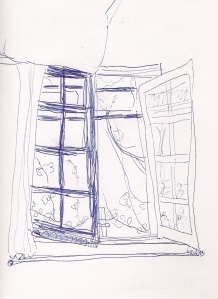 If we don’t learn better, we humans tend to be ego-centric (i.e. believing that others think, feel and experience the world the way we do). A great example of this is getting someone the perfect present… only to be crushed to see that they don’t appreciate it, don’t see why it’s so great.
If we don’t learn better, we humans tend to be ego-centric (i.e. believing that others think, feel and experience the world the way we do). A great example of this is getting someone the perfect present… only to be crushed to see that they don’t appreciate it, don’t see why it’s so great.
If we think about our children as having sensory windows, we can ask ourselves, “which windows are most open to receiving the world?” If you consider a particular child, and then ask yourself if they take things in better through their ears of their eyes, you already gain a clue in how to best teach them. Some kids need to touch things and have a hands-on sort of learning, while others are more cerebral—hanging back, watching, thinking things through before they jump in and experience them.
Another way to think about this perspective is not just which windows are most open in your child, but how intensely, or not, they experience whatever comes in their windows. Some kids are highly sensitive and practically gag at the faintest smell, while others are stimulation seekers and feel out of sorts if they are not engaged at a level that more sensitive kids might find overwhelming. Perhaps some kids have thick curtains over their windows while others have no way of shutting out the light and noise.
A practical example related to these issues is my younger son, who like myself, is not a genetically gifted speller. But he’s a terrific artist. Trying to learn spelling words for him would be like memorizing computer code or the obscure ingredients on a food package—it just didn’t hang together as relevant and cohesive in his mind. And sometimes we would think of visual pictures, and then he might draw a picture and link the word to it (i.e. drawing goal posts and placing the word “goal” between the bars); by creating a matrix of association, using the “window” of his right-brain spatial and imagistic strengths, he found a new way to sort, store and recover into working memory words that otherwise might be like so many letters all tossed randomly in a wheel-barrow.
After your child themselves, you just might be one of the top experts on your child. Pay closer attention to their windows, and this might help you stop saying, “I’ve told you a hundred times…” and instead, think, “if I’ve told them a hundred times and it didn’t “land,” perhaps I might show them instead of tell them.”
Maybe today is a good day to metaphorically wash the windows for a better view of where are kids live and breathe and experience things compared to which rooms are a little more vacant and unlikely to be good places to drop off information. As kids grow their brains tend to compensate and run alternates routes around their weaker areas, but in the meantime it’s good to keep self-esteem strong and rising by effectively communicating with our children. While we’re doing the windows, we might also think about our own preferred portals, and about how our conflicts with those we love might relate to this issue (i.e. she’s an engineer and wants to “fix” things while he’s a poet and simply wants to be understood, as is).
Let’s dedicate today to a deeper understanding of the windows of ourselves and of those we love, and let’s do it in the service of our kids, and of all our collective children (maybe thinking, for example, about how we value money and think that sending money to “poor” countries will help, when corruption often means that the people never get the help, while if we were to give seeds and equipment, people might grow food and appreciate it more than receiving subsidized food that does little to empower them, and wastes more energy than it provides). When we give what’s needed, rather than giving what we simply have lying around to spare, or giving what we felt like giving in the way we happen to be most comfortable giving, we begin to build real relationships. This might just be a way to improve our parenting and our world.
Namaste, Bruce


